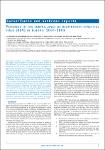Progress in the surveillance of respiratory syncytial virus (RSV) in Europe: 2001-2008
Meerhoff, T. J.
Mosnier, A.
Schellevis, F.
Schweiger, Brunhilde
Respiratory syncytial virus (RSV) surveillance is important to get insight into the burden of disease and epidemic pattern of RSV infection. This information is useful for healthcare resource allocation as well as the timing of preventive messages and palivizumab prophylaxis. For influenza surveillance the European Influenza Surveillance Scheme (EISS) was established in 1996, but no surveillance platform is available for RSV. To improve surveillance an RSV Task Group was established in 2003 and recommendations for RSV surveillance were developed. By 2008, progress was made for four out of six recommendations: the number of European countries testing specimens for RSV increased from six to fourteen; nose and/or throat swabs were generally used for detection of influenza and RSV; a total of 25 laboratories performed molecular testing for diagnosis and participated in a quality control assessment for RSV with an overall good performance; four of the ten countries that joined EISS in 2004 started reporting RSV detections in addition to influenza in the period 2004-8. Limited progress was achieved for standardising methods and the development of a sentinel surveillance system of representative hospitals. Improving RSV surveillance is possible by further harmonising the data collection and increased reporting of RSV.
Dateien zu dieser Publikation
Keine Lizenzangabe
Verwandte Publikationen
Anzeige der Publikationen mit ähnlichem Titel, Autor, Urheber und Thema.
-
2009-04-22ZeitschriftenartikelGenetic variability of group A human respiratory syncytial virus strains circulating in Germany from 1998 to 2007. Reiche, Janine; Schweiger, BrunhildeThe variability between respiratory syncytial virus (RSV) strains is one of the features of RSV infections that might contribute to the ability of the virus to infect people repeatedly and cause yearly outbreaks. To study ...
-
2016-02-11ZeitschriftenartikelLong-Term Shedding of Influenza Virus, Parainfluenza Virus, Respiratory Syncytial Virus and Nosocomial Epidemiology in Patients with Hematological Disorders Lehners, Nicola; Tabatabai, Julia; Prifert, Christiane; Wedde, Marianne; Puthenparambil, Joe; Weissbrich, Benedikt; Biere, Barbara; Schweiger, Brunhilde; Egerer, Gerlinde; Schnitzler, PaulRespiratory viruses are a cause of upper respiratory tract infections (URTI), but can be associated with severe lower respiratory tract infections (LRTI) in immunocompromised patients. The objective of this study was to ...
-
2019-07-24ZeitschriftenartikelEstimation of influenza‐ and respiratory syncytial virus‐attributable medically attended acute respiratory infections in Germany, 2010/11‐2017/18 an der Heiden, Matthias; Buchholz, Udo; Buda, SilkeBackground The burden of influenza in primary care is difficult to assess, since most patients with symptoms of a respiratory infection are not tested. The case definition of “medically attended acute respiratory infection” ...

